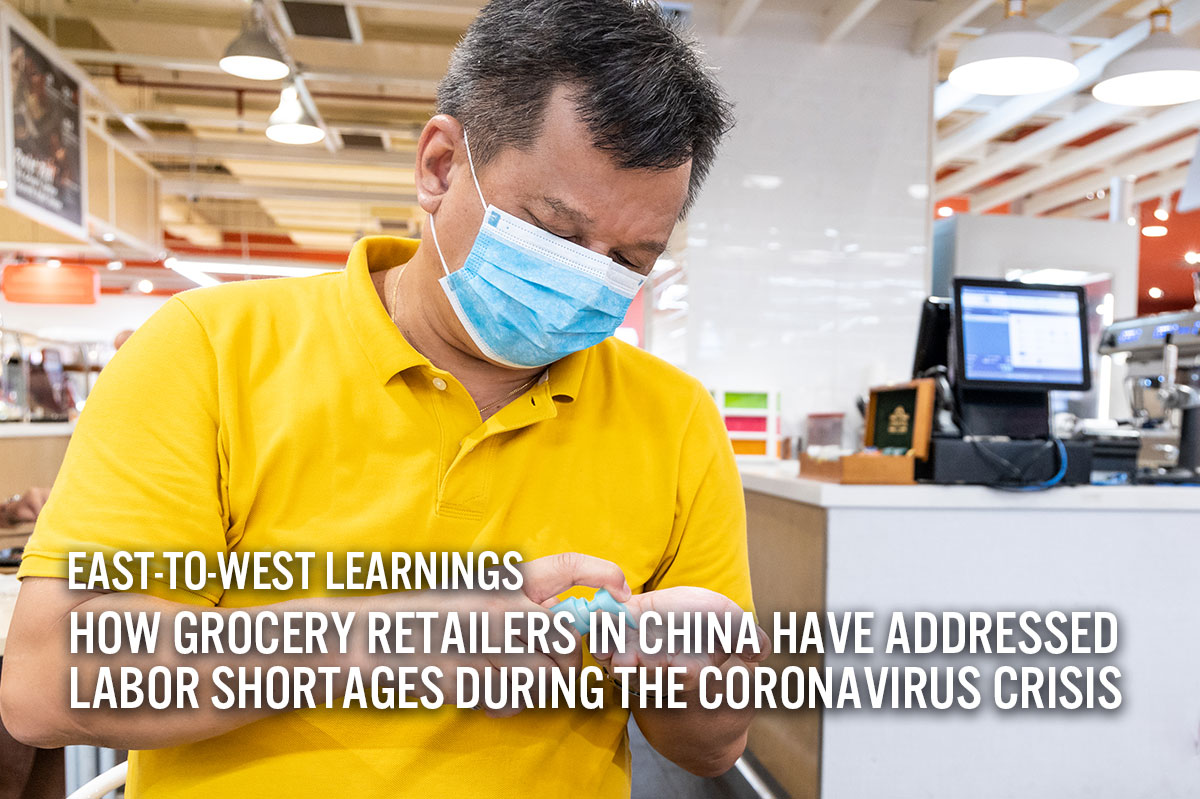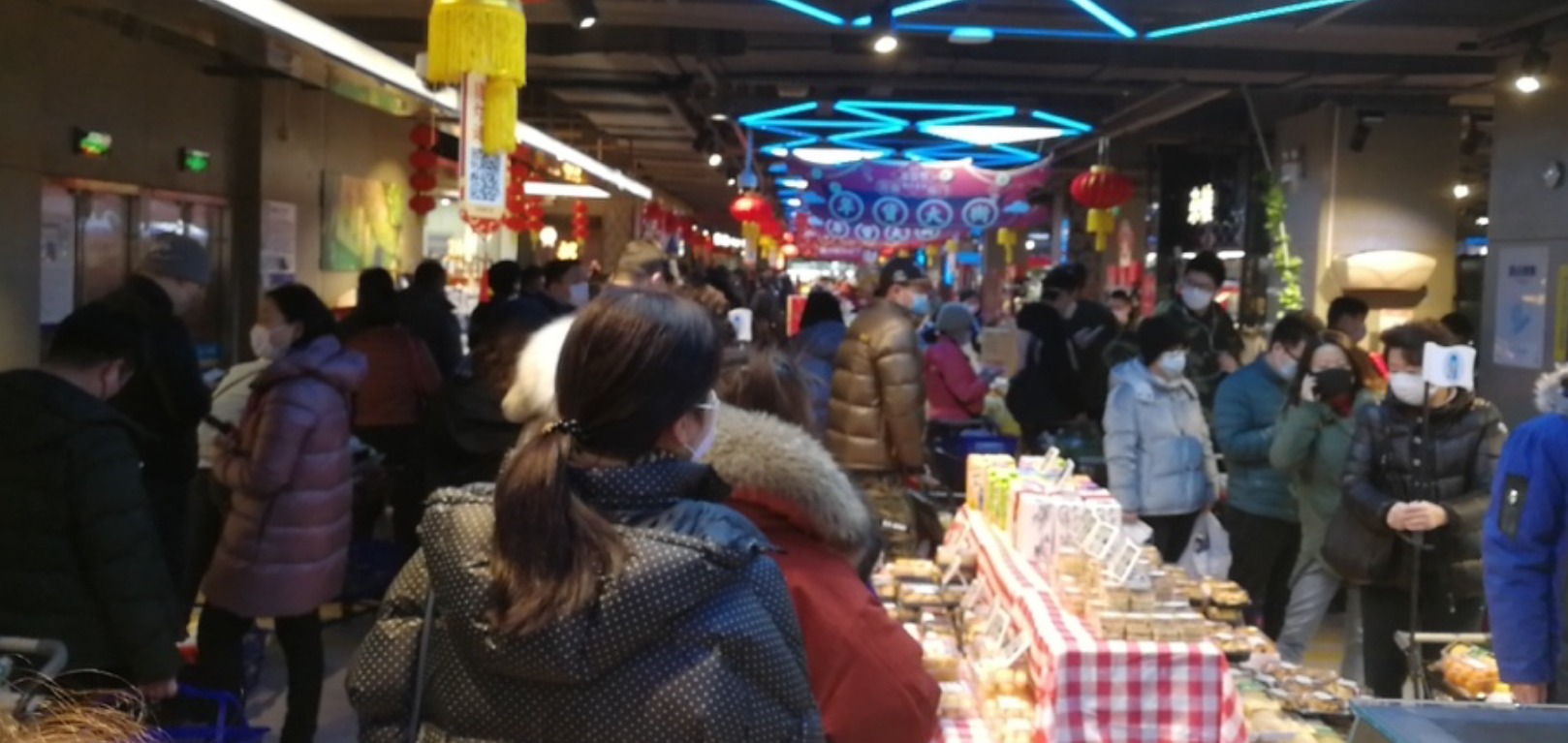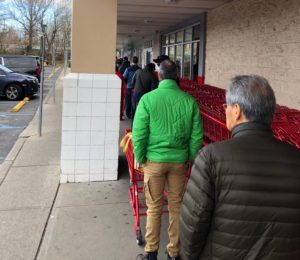
DIpil Das
During the coronavirus pandemic, Chinese domestic retailers have had their capacity, flexibility and quality of service tested. We assess how businesses have collaborated through the crisis, offering inspiration for other markets around the world that are enduring the coronavirus crisis.
Labor Imbalance in China Caused by the Coronavirus
The widespread shutdown caused by the coronavirus resulted in a labor imbalance in China. On the one hand, retailers such as supermarket chains and grocery stores experienced labor shortages, due to the sudden rise in demand for food and other essential products—both online and in store—as well as losing employees to home quarantines. According to the Bureau of Statistics of Hangzhou City, 11 supermarket brands experienced a 150% increase in orders at the beginning of February.
On the other hand, companies in the catering industry have shut down their operations due to the crisis, so they have idle employees. The resulting salary cost burden means that some companies are even facing bankruptcy as they are not bringing in revenue. According to the National Bureau of Statistics of China, the catering sector saw a decline of 43.1% in the first two months of 2020 compared to 2019. The China Cuisine Association reported that 93% of restaurants have chosen to close their businesses due to the coronavirus, of which 73% have shut down all of their chain locations. In February, 78% of restaurants in China lost 100% revenue, 9% lost 90% revenue, 7% lost 70–90% revenue and only 5% lost less than 70% revenue, according to iimedia.cn.
Co-Employment Initiatives
Alibaba’s Freshippo (formerly known as Hema) supermarket chain partnered with more than 30 major restaurant chains to address the labor imbalance by co-employing the catering staff. The restaurant chains include Yun Hai Yao (Mystic South Yunnan cuisine), Qingnian Canting (a modern chain for young people), 57 Degree Xiang, Shu Da Xia (Sichuan cuisine), Wang Xiang Yuan (Hunan cuisine) and Xi Bei You Mian (Northwestern Chinese cuisine).
Since the beginning of February 2020, Freshippo had around a 30% labor shortage, largely due to employees being unable to travel to work from their hometowns and the supermarket’s online orders surging threefold in some stores. The company made some adjustments to better cope with demand, such as extending guaranteed delivery times to two hours from the previous 30-minute service. Meanwhile, major chain restaurants such as Xi Bei You Mian were losing ¥700–800 million in revenue ($99 million to $1.1 billion), with ¥150 million ($21.2 million) in wages to pay each month.
Under the new partnership, restaurant employees were directly employed by Freshippo after an interview, but they were not required to quit their catering job, maintaining the flexibility to return to their previous job with three days’ notice. Through this model, Freshippo co-employed 2,700 workers across 40 stores within two weeks of launching the initiative. The co-sharing model takes into account how workers’ salaries and bonuses are shared by the companies, and Freshippo is now developing a new co-employment platform (to be launched in April) that is set to increase efficiency and facilitate better management of co-employed labor resources. Freshippo has reported that it may continue to operate a co-employment model even after the coronavirus crisis comes to an end, because it has seen the benefits of flexibility, cost savings and efficiency.
[caption id="attachment_106687" align="aligncenter" width="700"] A mid-sized Freshippo store in Shanghai in February 2020, packed with people shopping for supplies amid the coronavirus outbreak
A mid-sized Freshippo store in Shanghai in February 2020, packed with people shopping for supplies amid the coronavirus outbreak
Source: Coresight Research [/caption] JD.com’s 7Fresh supermarket chain also launched a “talent co-employment” program on February 5, 2020. Cao Chunhua, Head of Human Resources at 7Fresh, said that the company had reached out to employees in the catering sector to invite them to work for the supermarket while restaurants are temporarily closed during the coronavirus pandemic. Other grocery retailers in China—including Beijing Chaoshifa, Shengxian Chuanqi and Youhui—have adopted co-employment models. [caption id="attachment_106688" align="aligncenter" width="700"] Empty shelves in the noodle section of a Carrefour Shanghai, after people rushed to stock up on food
Empty shelves in the noodle section of a Carrefour Shanghai, after people rushed to stock up on food
Source: Coresight Research [/caption] Implications for US Retailers With the coronavirus situation worsening in the US, grocery retailers may experience similar labor shortages and capacity challenges to those exhibited in China. Consumer demand for food has surged in the US, both offline and online, with people trying to stock up on essential products as many states go into lockdown. At the same time, restaurants other catering services are likely to face financial difficulties and the problem of idle labor. Following China’s lead, US retailers may look to implement co-employment initiatives to help them meet rising demand and to better optimize labor resources. Tasks such as order maintenance, sales, product sorting, packaging and delivery can be easily picked up by employees “shared” by other companies after a period of training. If a retailer can provide a better shopping experience to its customers during the coronavirus crisis (e.g. shorter and faster lines, sufficient inventory and efficient delivery services), the company could win consumer loyalty that extends beyond the pandemic. For restaurants and other catering companies, co-employment models could help to lessen short-term financial burdens by reducing salary payoffs, while maintaining labor resources for after the coronavirus situation is over. [caption id="attachment_106689" align="aligncenter" width="480"] An orderly line at Trader Joe’s, with the retailer limiting store capacity to 50 customers at one time and implementing purchasing restrictions to limit panic buying during the coronavirus crisis
An orderly line at Trader Joe’s, with the retailer limiting store capacity to 50 customers at one time and implementing purchasing restrictions to limit panic buying during the coronavirus crisis
Source: Coresight Research [/caption]
 A mid-sized Freshippo store in Shanghai in February 2020, packed with people shopping for supplies amid the coronavirus outbreak
A mid-sized Freshippo store in Shanghai in February 2020, packed with people shopping for supplies amid the coronavirus outbreak Source: Coresight Research [/caption] JD.com’s 7Fresh supermarket chain also launched a “talent co-employment” program on February 5, 2020. Cao Chunhua, Head of Human Resources at 7Fresh, said that the company had reached out to employees in the catering sector to invite them to work for the supermarket while restaurants are temporarily closed during the coronavirus pandemic. Other grocery retailers in China—including Beijing Chaoshifa, Shengxian Chuanqi and Youhui—have adopted co-employment models. [caption id="attachment_106688" align="aligncenter" width="700"]
 Empty shelves in the noodle section of a Carrefour Shanghai, after people rushed to stock up on food
Empty shelves in the noodle section of a Carrefour Shanghai, after people rushed to stock up on food Source: Coresight Research [/caption] Implications for US Retailers With the coronavirus situation worsening in the US, grocery retailers may experience similar labor shortages and capacity challenges to those exhibited in China. Consumer demand for food has surged in the US, both offline and online, with people trying to stock up on essential products as many states go into lockdown. At the same time, restaurants other catering services are likely to face financial difficulties and the problem of idle labor. Following China’s lead, US retailers may look to implement co-employment initiatives to help them meet rising demand and to better optimize labor resources. Tasks such as order maintenance, sales, product sorting, packaging and delivery can be easily picked up by employees “shared” by other companies after a period of training. If a retailer can provide a better shopping experience to its customers during the coronavirus crisis (e.g. shorter and faster lines, sufficient inventory and efficient delivery services), the company could win consumer loyalty that extends beyond the pandemic. For restaurants and other catering companies, co-employment models could help to lessen short-term financial burdens by reducing salary payoffs, while maintaining labor resources for after the coronavirus situation is over. [caption id="attachment_106689" align="aligncenter" width="480"]
 An orderly line at Trader Joe’s, with the retailer limiting store capacity to 50 customers at one time and implementing purchasing restrictions to limit panic buying during the coronavirus crisis
An orderly line at Trader Joe’s, with the retailer limiting store capacity to 50 customers at one time and implementing purchasing restrictions to limit panic buying during the coronavirus crisis Source: Coresight Research [/caption]